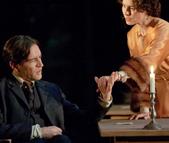SITE GUIDE
SEARCH
REVIEWS
REVIEW ARCHIVES
ADVERTISING AT CURTAINUP
FEATURES
NEWS
Etcetera and
Short Term Listings
LISTINGS
Broadway
Off-Broadway
NYC Restaurants
BOOKS and CDs
OTHER PLACES
Berkshires
London
California
New Jersey
DC
Connecticut
Philadelphia
Elsewhere
QUOTES
TKTS
PLAYWRIGHTS' ALBUMS
LETTERS TO EDITOR
FILM
LINKS
MISCELLANEOUS
Free Updates
Masthead
Writing for Us
A CurtainUp  London Review
London Review
 London Review
London ReviewFarewell to the Theatre
|
When we no longer have theatre, it means we are dead.
— Harley Granville Barker
|

Ben Chaplin as Harley and Tara Fitzgerald as Beatrice (Photo: Stephen Cummiskey) |
Hildegarde Bechtlerís lovely set is dark with plain floorboards, wooden tables and plain chairs, black curtains dominate the rear of the stage but there is a beautiful, holographic glimpse of trees through a floor to ceiling plate glass window screen of the grounds beyond. It was HGB who pioneered some amazingly well designed Shakespearean productions. Look at images of his Art Nouveau A Midsummer Nightís Dream at The Savoy Theatre in 1914 or the futuristic black and white Twelfth Night of 1912.
Roger Michellís production is finely acted and redolent in Chekhovian atmosphere. HGB (Ben Chaplin) entertains us with his Wildean wit and disdainful amusement, relating tales of the theatre. Jason Watkins is a Dickensian expert who entertains with readings from the novelist and here we get an animated and multi-voiced excerpt from The Pickwick Papers whilst he conceals personal tragedy. By contrast, Tara Fitzgerald is Beatrice Hale, a lecturer and actress in her forties, her marriage also on the rocks, gushingly in love with a college student Charles Massinger (William French), who will be playing Feste in the college production of Twelfth Night. Brother and sister, English lecturer Henry (Louis Hilyer) and Guest House keeper Dorothy (Jemma Redgrave) have back stories of their own. Henry is the victim of a vindictive principal Professor Weston, whom we never meet, in a trumped up plot against his tenure at the college. Dorothyís marriage was a sham and all but her knew about it in this small academic community. Andrew Havill completes the cast as the very twitchy lecturer George Smith.
Ben Chaplin with a centre parting looks remarkably like HGB. His performance is of a man not sure of his own direction, yet a raconteur of some skill who can hold an audience. Soon after this is set in 1918 HGB marries the wealthy Helen Huntingdon and concentrates on writing about rather than acting and directing and producing theatre. Each of the men has a sad and poignant tale to tell. The exception is the only American in the cast, Charles Massinger who has chosen career advancement over integrity. Tara Fitzgerald dotes on Charles in an embarrassing way. Jemma Redgraveís Dorothy busies, laying the table and serving the supper but later confides in Granville Barker about her brother.
The stories come together to underline HGBís belief in the importance of theatre, central to our society and his directorial move away from the artifice and posing of Victorian melodrama and a naturalness of speech as well as his belief in the role a national theatre could play in experimentation and raising standards. The closing scene has a joyful Mummersí play put on by the cast. If you donít know about Harvey Granville Barker the man and collaborator of George Bernard Shaw, you will come away wanting to know more and to see his own plays Waste and The Voysey Inheritance amongst others. Note: Granville Barker himself wrote a rarely performed play called Farewell to the Theatre in 1916.
|
Subscribe to our FREE email updates with a note from editor Elyse Sommer about additions to the website -- with main page hot links to the latest features posted at our numerous locations. To subscribe,
E-mail: esommer@curtainup.comesommer@curtainup.com
put SUBSCRIBE CURTAINUP EMAIL UPDATE in the subject line and your full name and email address in the body of the message -- if you can spare a minute, tell us how you came to CurtainUp and from what part of the country. |
| Farewell to the Theatre
Written by Richard Nelson Directed by Roger Michell Starring: Ben Chaplin, Jemma Redgrave, Jason Watkins, Louis Hilyer, Tara Fitzgerald With: William French, Andrew Havill, Designed by Hildegarde Bechtler Lighting: Rick Fisher Sound: John Leonard Running time: One hour 50 minutes without an interval Box Office: 020 7722 9301 Booking to 7th April 2012 Reviewed by Lizzie Loveridge based on 7th March 2012 performance at Hampstead Theatre, Eton Avenue, London NW3 3EU (Tube: Swiss Cottage) |
|
REVIEW FEEDBACK Highlight one of the responses below and click "copy" or"CTRL+C"
Paste the highlighted text into the subject line (CTRL+ V): Feel free to add detailed comments in the body of the email . . . also the names and emails of any friends to whom you'd like us to forward a copy of this review. |




